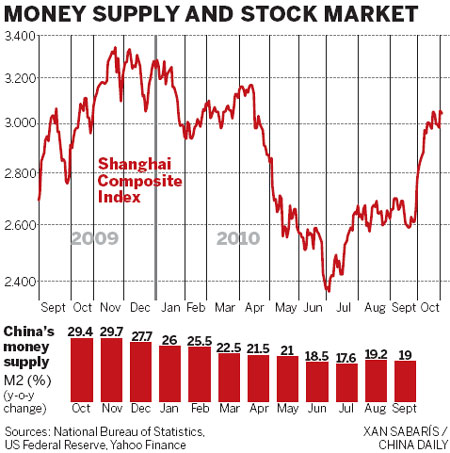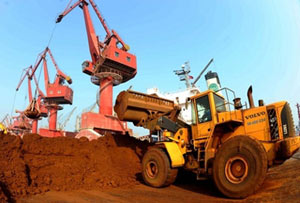Economy
'Firewall needed' to prevent cash surge
By Wang Bo and Wang Xiaotian (China Daily)
Updated: 2010-11-05 09:09
 |
Large Medium Small |
Warning over capital influx as US starts 'unbridled money printing'
BEIJING - China should "set up a firewall" as uncontrolled dollar printing in the United States will drive more liquidity into emerging markets, a central bank adviser said on Thursday.
"The most urgent need for the emerging market economies is to curb capital inflows," Xia Bin, an academic member of the central bank's monetary policy committee, told a financial forum in Beijing.
Xia's comments came as the US Federal Reserve announced a new round of quantitative easing - pledging to buy $600 billion of government bonds - to prop up the ailing economy.
Claiming the US quantitative easing was "unbridled money printing", Xia said China should push for plans to stabilize the world's major currencies at the upcoming G20 summit.

In an essay published on Thursday elaborating his thoughts on reforming the international framework for prudent macroeconomic management, Xia warned that "another crisis would be inevitable" if the world failed to restrain the issuance of major reserve currencies, such as the US dollar.
Policymakers in emerging market economies criticized the Fed's decision of pumping money into the economy, as they fear the flood of cash will intensify asset-bubble risks and push up their currencies. Analysts said such countries might roll out more measures to curb capital flows.
World stock markets climbed on Thursday as the Fed move boosted liquidity. The benchmark Shanghai Composite Index closed at 3,086.94, a nearly seven-month high, while other major stock markets in Asia also responded positively as investors are betting on more money flowing into emerging markets.
Oil prices approached $86 a barrel thanks to the US quantitative easing plan.
High real estate prices in China's major cities and the country's well-performing stock market, which has rebounded about 30 percent from the July low, could receive a boost from capital inflows, analysts said.
Xia said he is concerned about asset-bubble risk in China as a spillover from US policy.
Pressure for yuan appreciation could also increase, analysts said.
"The quantitative easing policy might not fulfill the target of revitalizing the US economy as the country's financial system is still saddled by heavy debts, but the move will add pressure for yuan appreciation," said Li Daokui, central bank adviser and professor at Tsinghua University.
The central bank set the reference rate of the yuan at 6.6708 against the greenback on Thursday while the dollar continued to weaken. But Li said there is no need to "overly panic", and China's exchange rate should move at its own pace.
Li said there will be a substantial amount of speculative capital flow into China, but given the country's $5.5 trillion economy, the shockwave of "hot money" would be limited compared to its impact on Brazil and India.
"China is less sensitive or vulnerable to capital inflows given the comprehensive capital controls," said Louis Kuijs, senior economist with the World Bank.
"The quantity of capital inflows (into China) is smaller than other countries in Asia, and the risks are still manageable," Kuijs said.
Donna H. J. Kwok, an economist with HSBC, said the existing tight controls will keep out a tide of capital inflows.
| |||||||
China's central bank raised interest rates by 25 basis points in October for the first time in nearly three years to curb inflationary pressure after consumer inflation rose to 3.6 percent in September.
Richard Lambert, director-general of the Confederation of British Industry, called the latest US move a "logical step" because "it's clear that the economy has not recovered from the recession".
Lambert said he understands "China's concerns that such a loose policy will have implications for the relationship of the currencies between the two countries".
"I welcome China's policy to let the currency rise some more," he said as it would be "an error for China and the US" if the currency dispute worsened.
Li Xiang, Lu Chang, Zhang Chunyan and Zhang Haizhou contributed to this story.
?
 Special Coverage: Rare as it is
Special Coverage: Rare as it is

